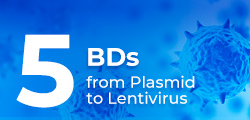Synthetic modified viral sequences produce safer, more effective DNA vaccines.
Diniz et al. report in Human Gene Therapy that codon optimization augmented both the immunogenicity and the therapeutic anti-tumor effects induced by a DNA vaccine targeting human papillomavirus (HPV)-induced tumors. At the same time, introducing specific point mutations into a viral sequence, such as the modification of the E7 protein sequence found in HPV, can abolish residual oncogenic effects rendering the vaccine less likely to cause harm.
Gene synthesis of codon-optimized antibodies allow isolation of viral epitopes for structural study and rational design of more potent drugs
A recent Science paper reports the discovery of a novel antigenic site for respiratory syncytial virus (RSV) that will enable rational design of vaccine antigens. Using synthetic codon-optimized heavy and light chains of antibodies that bind the RSV F glycoprotein in its prefusion state, McLellan et al. obtained the first crystal structure of the metastable prefusion conformation of RSV F. This structural characterization allowed them to identify a novel antigenic site, termed "site Ø". Antibodies targeting site Ø are extremely potent, and hold promise to reduce the morbidity and mortality of this ubiquitous childhood virus.







































